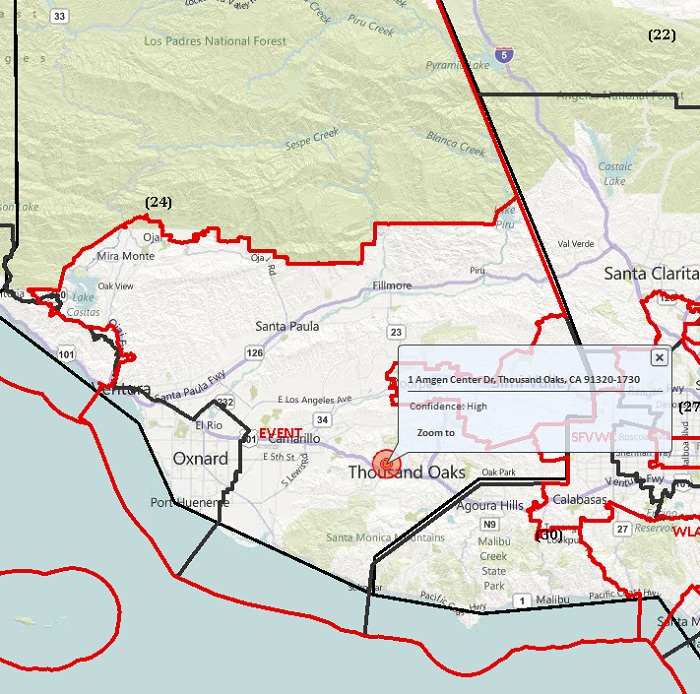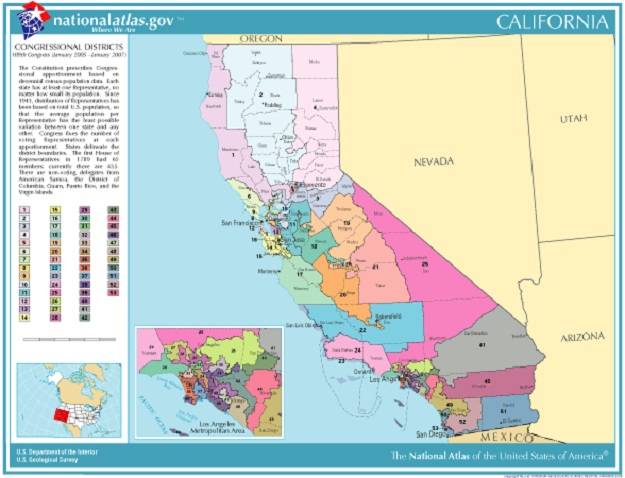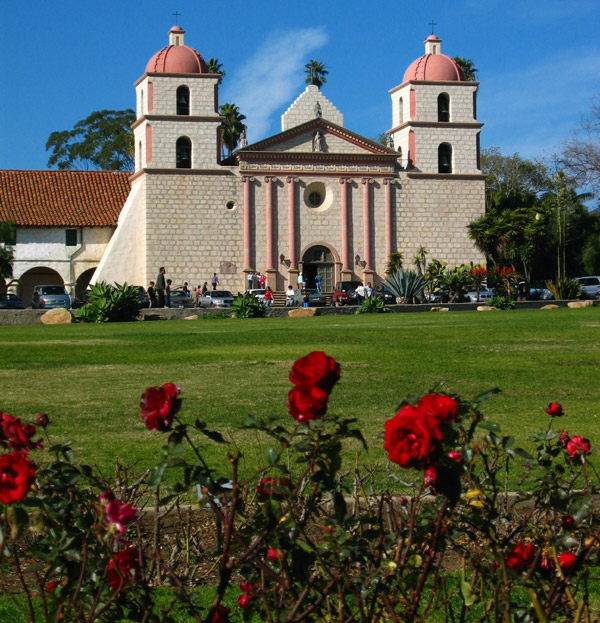-
California Citizen’s Redistricting Commission Creates Competitive Ventura County Congressional District Without an Incumbent

Draft Congressional District map from the Rose Institute
The California Citizen’s Redistricting Committee today released its draft redistricting maps for California Congressional and Legislative districts.
In Ventura County and particularly where I live in Thousand Oaks, a new Congressional District has been carved out without an incumbent Representative. Currently, GOP. Rep. Elton Gallegy is my Congressman.
If this draft makes its way into final form, Rep. Gallegly will either have to move from his home (or not, since Reps. are not required to live in their representative districts) since Simi Valley is not included in this district.
One of the most dramatic impacts would be felt by 13-term Republican Congressman Elton Gallegly of Simi Valley. The draft congressional maps place his hometown of Simi Valley, along with Moorpark, in a district that extends eastward into Santa Clarita and Palmdale. That area is the home turf of 10-term Republican Congressman Howard “Buck” McKeon.
The map also creates a congressional district without an incumbent living in its boundaries — the district that includes nearly all of Ventura County except for Simi Valley and Moorpark. Gallegly could consider running in that district, since he has represented all of those areas at some point in the past. But the voter-registration breakdown in that district, 42 percent Democrats versus 35 percent Republicans, would make it a challenge for candidates from both parties.
Game on, for this competitive Congressional seat should Gallegly decide not to move.
-
California Citizen’s Redistricting Committee Votes 14-0 to Approve First Draft District Maps
The California Citizens Redistricting Commission has released a two minute video featuring all 14 members of the Commission talking about the redistricting process for Legislative and Congressional districts and asking the public for help.The first maps are out for California’s Congressional, State Assembly, State Senate and Board of Equalization Districts. The link to the draft maps is here.
With four 14-0 votes, the California Citizens Redistricting Commission has released its first round of draft maps for Congressional, State Assembly, State Senate and Board of Equalization districts.
The Commission is now soliciting public comment on the draft districts. Testimony can be submitted online to votersfirstact@crc.ca.gov, by mail to the Citizens Redistricting Commission, 901 P Street, Suite 154-A, Sacramento, CA 95814 or by FAX at 916-651-5711. The Commission will be holding 11 public input hearings in June on the draft maps. The hearing schedule and the draft maps can be found at the Commission’s website at www.wedrawthelines.ca.gov.
Now, remember folks these are draft maps and the pundits will be going crazy with the political permutations.
And, California Republicans don’t be too disappointed because California continues to be a deep blue state demographically. While redistricting will improve some chances of winning a few seats, particularly in the California Legislature, the fact is the GOP will probably lose 3-5 GOP Congressional seats to the Democrats. The Democrats will continue to dominate the Republicans in the state legislature, just as they have for a couple of decades now.
So, have at the maps and write, e-mail or fax your thoughts and concerns to the Citizen’s Commission.
I will post more analysis about individual maps and districts as they become available.
-
Flap’s California Morning Collection: June 9, 2011
 A morning collection of links and comments about my home, California.
A morning collection of links and comments about my home, California.Radio hosts change tune on tax election, then so do GOP lawmakers
Gov. Jerry Brown and Democrats in the Legislature have long complained that Republicans in the Legislature take their policy cues from radio hosts John Kobylt and Ken Chiampou.
The timing of Republicans’ new position in budget talks –- that they would now support an election on tax extensions, but not a “bridge tax” until that election -– will likely only add fuel to that fire.
The new GOP stance comes only days after Kobylt and Chiampou, whose KFI-AM (640) drive-time show reaches more listeners than any other non-syndicated talk program in California, changed their own opinion on the matter.
After months of pillorying Republicans who dared to negotiate about a special election on extending current vehicle and sales tax rates to help balance the budget — calling for the “head on a stick” of any GOP legislator who would relent to Brown’s proposal — Kobylt announced last Thursday that he had changed his mind.
“I think we ought to go and have the referendum since it probably will be voted down, all the taxes,” Kobylt said. He said his change of heart was the result of studying poll numbers for the tax extensions that Brown seeks. “The Republicans that we put the heads on a stick? Let them put this on the ballot now, because I think we’re going to win,” he said.
Brown said in an interview Tuesday that Republicans are now supportive of a fall election in exchange for concessions on a spending cap, public-employee pension changes and regulatory overhaul. The “sticking point” concerns extending the current tax rates until an election can be held, Brown said. State Senate Budget Committee Vice Chairman Bob Huff (R-Diamond Bar) concurred.
GOP’s SF Invasion: Romney, Pawlenty and Coulter coming!
Oh, sure the GOP loves to dis San Francisco and its “values” — but they do love the cash that pours out of the Bay Area. Yes, even for Republicans.
That’s why we’ll be seeing Republican Prez hopefuls Mitt Romney and Tim Pawlenty passing through town this month toting burlap bags to scoop up the local cabbage.
Not that we will be permitted to attend Mitt’s fundraiser. They are closed to the press, his spokesperson tells us. Hmmmm. President Obama allows the press in to his fundraisers — even if his flacks get their blue blazers in a bundle when we actually, oh, report what goes on there.
Nevertheless, the ex-Massachusetts Guv is scheduled to show at a BBQ at the Portola Valley home of Sun Microsystems founder Scott McNealy. 6 p.m. June 21. McNealy, you remember, is a pal and major donor to the guv campaign of fellow Silicon Valley CEO Meg Whitman — who is helping Mitt with fundraising.
The cost of being within combing distance of Mitt’s mane: $1,000 per person or $10,000 to host, according to the invite.
David Kieffer, head of Service Employees International Union California, sees an opportunity to defeat conservative Republicans in 2012 by taking advantage of the state’s new “top-two” primary system.
He told The Bee’s Capitol Bureau on Wednesday that SEIU would even discourage Democrats from running in places they can’t win to avoid taking votes from moderate Republican candidates. And he wants Democratic voters who have selected the “D” candidate for years to start thinking more strategically in red districts.
Union Chief Says Jerry Brown’s Tax Vote is “Fraught With Peril”
As Gov. Jerry Brown presses Republicans for a mid-September election on taxes, a major Democratic labor ally warned Wednesday that going to the electorate is “terribly fraught with peril.”
David Kieffer, executive director of the Service Employees International Union California State Council, instead wants lawmakers to reach a bipartisan agreement to extend taxes in the Legislature.
He said his group is not obligated to finance a fall tax campaign and would have to weigh that multimillion-dollar expense against spending in 2012 legislative races.
“It’s my members’ money,” Kieffer told The Bee’s Capitol Bureau. “And if I went to my members and my board and said we can either play heavily and do good politics in 2012 or we can lose an election with this money, I think I don’t even have to pose the question to get the answer.”
Brown said Tuesday he is eyeing a mid-September special election in which voters would decide whether to extend higher taxes on sales and vehicles, as well as reinstate an income tax surcharge.
The main negotiating hurdle, Brown and GOP lawmakers said, is whether to approve a funding bridge that maintains higher sales and vehicle taxes until the election. They are close on other items, such as a spending cap and pension cuts for new employees.
The idea of having a special election remains popular among voters, including those who oppose the taxes. A Public Policy Institute of California poll showed last week that 62 percent of likely voters support going to the ballot.
Kieffer said his polling shows only half of voters support extending higher taxes, even though a greater share is opposed to further spending cuts. He said one problem is that taxes won’t be framed on the ballot as a choice between taxes and cuts.
Enjoy your morning!
-
Flap’s California Morning Collection: June 8, 2011 Redistricting Edition

Rep. Sanchez regains turf in redistricting draftAmid growing scrutiny of a draft plan for the state’s congressional redistricting, an update draft released today restores a key chunk of Rep. Loretta Sanchez‘s Democratic Latino district. That district had been virtually eliminated in a previous draft.
However, the new map – which will face additional revisions – shows a Sanchez district that is more evenly balanced between Democrats and Republicans than the current configuration.
The latest configuration could set up a showdown between Latino and Vietnamese-American voters. The proposed boundaries shows a population with 32 percent Latino citizens of voting age and 28.4 percent Asian citizens of voting age. Asians – including Vietnamese-Americans – historically turn out to vote in higher percentages than Latinos.
The latest map, which is being reviewed today by the California Citizens Redistricting Commission, could also set up a dogfight between GOP Reps. Dana Rohrabacher and John Campbell. The map puts the biggest cities in Rohrabacher’s current district – Huntington Beach and Costa Mesa – in the same district as the biggest cities in Campbell’s current district – Irvine and Newport Beach.
California Citizen’s Redistricting Commission: Map Revisions for June 7, 2011
Zipped PDF Files for AD Region I, II, and III Visualizations (zip, 1.9MB, June 7, 2011)
Zipped PDF Files for AD Region IV Visualizations (zip, 7.4MB, June 7, 2011)
Zipped PDF Files for AD Region V, VI, VII, VIII, and IX Visualizations (zip, 2.2MB, June 7, 2011)
Additional PDF File for AD Region V, VI, VII, VIII, and IX Visualizations (zip, 1.1MB, June 7, 2011)
Zipped PDF Files for SD Region I, II, and III Visualizations (zip, 859kB, June 7, 2011)
Zipped PDF Files for SD Region IV Visualizations (zip, 2.4MB, June 7, 2011)
Zipped PDF Files for SD Region V, VI, VII, VIII, and IX Visualizations (zip, 1.4MB, June 7, 2011)
Zipped PDF Files for CD Region I, II, and III Visualizations (zip, 1.9MB, June 7, 2011)
Zipped PDF Files for CD Region IV Visualizations (zip, 1.3MB, June 7, 2011)
Zipped PDF Files for CD Region V, VI, VII, VIII, and IX Visualizations (zip, MB, June 7, 2011)Redistricting threatens to throw San Francisco politics into chaos
San Francisco will lose power in state government. A portion of The City could be unrepresented in the state Senate for two years. And a host of career politicians’ futures are flailing wildly in the winds of redistricting.
Those are the wild possibilities confronting San Francisco’s political leadership this week, after the first peek at how the state’s independent Redistricting Commission — California’s first-ever attempt at politics-free district drawing — may reapportion the lines of power in California.
The commission released “visualizations” of the new districts for California’s Senate, Assembly and the U.S. Congress this week. If the lines they reveal remain even roughly the same as those drafts undergo revisions in coming months, San Francisco will lose a state Senate seat, a potential blow to The City’s influence in the Legislature.
Opinion: Redistricting turns up heat on Latinos, other minorities
The state’s 2011 redistricting process reached a milestone in late May when the new California Citizens Redistricting Commission completed accepting public testimony before it releases drafts of new lines for the state’s Assembly, Senate and Congressional districts. The final hearing, which included formal presentations by civil rights organizations, was preceded by a series of public hearings throughout the state, many of which were unevenly attended.
This new redistricting process, in which the task of redrawing the lines was removed from the state legislature by Propositions 11 and 20 and placed in the hands of a 14-member Commission, is intended to eliminate incumbent protection interests and partisan politics. Based on the hostility exhibited at several hearings toward some Latinos and other minorities, and the line of questioning of the civil rights organizations by some of the Commissioners at the final hearing, it appears that this redistricting process may become mired in a different kind of politics. The public should take note.
The Commission has been hampered in its work by an insufficient budget. As a result, the Commission conducted only limited public outreach of its own, relying on scant coverage by the news media and the outreach by a handful of organizations to get the word out to traditionally underrepresented communities. Not surprisingly, the public testimony has been imbalanced, with traditionally engaged voters actively participating, and many underrepresented communities relying on the efforts of statewide and national organizations to represent their interests.
At several hearings, Latino community leaders in attendance often bore the brunt of the animus from those who objected to the Commission’s legal mandate to ensure compliance with the federal Voting Rights Act (VRA). The VRA prohibits the vote dilution of Latinos, African Americans, Asian Americans and other protected voters, and requires that districts be created where these groups can comprise the majority of voters. Vote dilution occurs by over concentrating or fragmenting politically cohesive and geographically compact minority communities. The Commission is required to make VRA compliance the second most important criterion it employs, second only to equalizing population among the districts.
Enjoy your Morning!
-
Flap’s California Morning Collection June 7, 2011
 A morning collection of links and comments about my home, California.
A morning collection of links and comments about my home, California.
California Retailers Association backs Brown’s tax extensionsGov. Jerry Brown picked up some heavyweight support for his budget plan Monday when the California Retailers Association endorsed extension of sales, income and car taxes to close the budget’s deficit.
“Governor Brown is sincerely addressing the state’s long-term fiscal problems and has convinced us of the need to extend the 2009 tax increases,” CRA’s president, Bill Dombrowski, said in a statement. “This is part of an overall budget that addresses the mountain of debt facing the state. We support a vote to extend the tax increases and to put them on the ballot in a special election. We also plan to support passage of the extensions during the campaign.”
Brown has been attempting to enlist support of business groups for his budget plan in hopes of garnering the Republican votes he needs – at least two in each legislative house – to place the extensions on the ballot.
The temporary taxes, which include a one-cent increase in the sales tax, were enacted in 2009 as budget-balancing measures. The income tax surcharge expired at the end of 2010 and the sales and car tax increases expire on June 30.
Ethics agency will not investigate complaint over Schwarzenegger affair
The state’s ethics agency has rejected a request by the Los Angeles County Democratic Party to investigate whether former Gov. Arnold Schwarzenegger violated any state laws during an affair with a housekeeper that resulted in his fathering a child.
A complaint that did not allege any specific wrongdoing was filed with the state Fair Political Practices Commission, which enforces the state Political Reform Act regulating campaign finances.
“The Fair Political Practices Commission will not open an investigation into this matter,” wrote Executive Director Roman Porter in a letter to party attorneys. “After review of your complaint, the information you provided is insufficient to establish a violation of the act.”
New California legislative maps make good on promise of reform
When voters were asked to create an independent redistricting commission, they were told that it would end self-serving gerrymanders secretly drafted in the Capitol’s back rooms and thus make elections less predictable and more meaningful.
The 140-member commission and its consultants and attorneys are still fine-tuning draft maps of 153 congressional and legislative districts prior to Friday’s official release, but at first glance, the maps appear to fulfill that promise.
Were the maps to be adopted by the commission later in the summer and to survive legal challenges, they would create more “swing” districts – winnable by either major party – and probably result in more Latino and Asian American officeholders.
While Democrats would no doubt remain in control of both legislative houses, whether they would achieve their long-sought goal of two-thirds majorities, thereby gaining power over taxes, would depend on how the parties adjust.
An increase in swing districts would mean that right-wing Republicans and left-wing Democrats would no longer be assured of winning seats after nomination. The state’s new “top-two” primary system would, at least in theory, also work against ideological rigidity. Together, they could create new and perhaps decisive blocs of moderates from both parties.
Republican Tony Quinn, one of the few genuine experts on redistricting and one of the commission’s sharpest critics, says he’s pleasantly surprised. “The maps are balanced in partisan terms,” Quinn wrote in a blog Monday (and) “both parties have reason to be pleased and displeased. There is no partisan advantage in these first maps. And the maps draw a remarkable number of politically marginal districts.”
The maps’ impact on the state’s 53 congressional members would be especially heavy – in part because they were especially benefited by the bipartisan gerrymander in 2001. With so many incumbents 60-plus years old, the maps probably would generate a large number of retirements and, with their replacements likely to be state legislators, would have a domino effect on the Capitol.
Draft congressional district threatens Sanchez
An early draft of new congressional district boundaries does away with the Democratic Latino district now represented by Rep. Loretta Sanchez, D-Santa Ana, and puts Sanchez into a largely coastal, GOP-controlled district now largely represented by Rep. Dana Rohrabacher, R-Costa Mesa.
The draft also creates a heavily Asian district centered around Little Saigon.
I’ve spoken with two people from the independent citizens commission drawing up the lines, and both emphasized that these district lines will undergo several rounds of revision.
“These are working maps,” said Jodie Filkins Webber, a commissioner and an attorney based in Orange.
“This is a very preliminary stage. We welcome input. We hope people will look at these closely and let us know their concerns.”
Enjoy your morning!
-
California Congressional Redistricting: Visualizations Have Thousand Oaks Thrown Into Democratic San Fernando Valley District

Map courtesy of Redistricting Partners
Yes, it looks like the Conejo Valley of which Thousand Oaks is a part (where I live) will be merged with the West San Fernando Valley and its predominate Democratic registration. GOP Rep. Elton Gallegly will no longer be my congressman.Western and southern portions of the San Fernando Valley were drawn into a district that extends into the Ventura County’s Conejo Valley. This would make the San Fernando Valley vote most important in the district. Brad Sherman and Howard Berman are drawn into the same seat, but this is much more a Brad Sherman district based on where these two members of congress have run and won in the past.
The visualizations could very well change by the release of the drafts on Friday, and most likely will change before final versions are issued no later than Aug. 15.
I can only hope.
-
Flap’s California Morning Collection: June 6, 2011
 A morning collection of links and comments about my home, California.
A morning collection of links and comments about my home, California.
California controller says lawmakers won’t get paid without budget dealCalifornia’s controller told lawmakers Thursday that he won’t pay them if a budget deal isn’t reached by midmonth, while Gov. Jerry Brown said talks are at a critical point.
Brown’s negotiations with Republican lawmakers, though sputtering for months, appear to have picked up in recent weeks, with the rarely met constitutional deadline looming June 15.
“We are at a critical moment in the next 10 days,” Brown told about 1,000 people Thursday morning at the California Chamber of Commerce’s annual Host Breakfast in Sacramento. “There’s compromises and discussion going on.”
State Controller John Chiang added pressure in a written statement by announcing that lawmakers will forfeit salaries and per diem payments if they fail to approve a balanced budget by the deadline.
REDISTRICTING: Remap panel strives to keep communities together
Do Corona residents identify more with Orange County than with their Riverside County brethren? Do residents of the San Gorgonio Pass spend their recreation time in the mountains or the desert? And does Moreno Valley really belong in the same congressional district with Palm Springs?
The independent panel tasked with drawing new political lines for California must answer these and other such questions as it sets out to create congressional districts that serve “communities of interest,” a vaguely defined designation that takes into consideration media markets, demographics and other variables.
The 14-member Citizens Redistricting Commission — set to release draft statewide maps on Friday — has crisscrossed the state in recent months, collecting testimony from people with often opposing viewpoints about what the new districts should look like. The commissioners must digest all of the feedback and balance it against other priorities, including compliance with the federal Voters Rights Act and creating congressional districts that are as close as possible to 702,905 people each.
Friday is the big day for California POLS as the first reapportionment maps are released. Everyone is on pins and needles until then. Their political fortunes hang in the balance of the census-driven redistricting.
DeMaio, Fletcher jump in San Diego mayoral race
After months of will-they-or-won’t-they speculation, San Diego City Councilman Carl DeMaio and state Assemblyman Nathan Fletcher say they are each running for mayor of San Diego next year.
The two Republicans join what could end up being a crowded field of contenders with no clear front-runner to replace Mayor Jerry Sanders, who is being forced out by term limits. The wide open race has already attracted District Attorney Bonnie Dumanis while a dozen others, from City Councilman Kevin Faulconer to Rep. Bob Filner to state Sen. Christine Kehoe, have expressed interest.
The mayoral primary is exactly 12 months away — June 5, 2012 — and city campaign laws prevented candidates from collecting contributions until today, hence the decision by DeMaio and Fletcher to begin their official campaigns now.
Enjoy your morning!
-
Flap’s Saturday California Collection: June 4, 2011
 A Saturday collection of links and comments about my home, California.
A Saturday collection of links and comments about my home, California.Steinberg’s local tax bill has become a state budget bargaining chip
A controversial bill by Senate President Pro Tem Darrell Steinberg to give local governments broad new taxing authority has rattled the industries whose products and services are targeted.
Business groups – including oil, tobacco and alcohol interests – have kicked opposition efforts into high gear, with one group launching radio ads and mail pieces blasting the bill.
“This is the most intense threat that we’ve seen,” said Scott MacDonald, a spokesman for the business-backed coalition Californians Against Higher Taxes. “It’s got everyone’s attention.”
By most accounts, that’s just what Steinberg wants. The measure has become a key bargaining chip in state budget negotiations that could leverage agreement over Gov. Jerry Brown’s plan to extend state sales, income and vehicle taxes.
“If we can reach this agreement over the next week, which I believe is vital for public education and public safety in this state, I will then not move (the bill),” Steinberg said this week.
Republicans criticize Democrats’ local tax push
Frustrated by the difficulty of raising taxes in the Legislature, California Democrats want to broaden the ability of cities, counties and school districts to do it themselves. But Republican lawmakers on Friday suggested they’re going about it in a sneaky way.
Senate President Pro Tem Darrell Steinberg said earlier this week that he would make a local tax hike proposal part of the state budget package, thinking that would make it exempt from being challenged in a statewide ballot referendum.
On Friday, Assembly Republicans said they had obtained a legal opinion from an attorney for the Legislature suggesting the public does have the right to overturn Steinberg’s local tax plan if it’s signed into law.
“His measure flies against the will of the people and just shows how hungry Democrats are for taxes even when voters have shown no appetite for them,” said Darrel Ng, a spokesman for Assembly Minority Leader Connie Conway of Tulare.
Boeing lays off 100 workers in Huntington Beach due to end of space shuttle program
With the nation’s space shuttle program coming to a close, Boeing Co. issued layoff notices Friday to 100 employees in its Space Exploration division at Huntington Beach.
The last workday for the workers is scheduled to be Aug. 5, pending completion of the final shuttle mission. Space shuttle Atlantis is slated to blast off from Cape Canaveral, Fla., on July 8.
Boeing handed 60-day advance layoff notices to approximately 510 employees companywide. In addition to the 100 workers in Huntington Beach, about 260 employees in Houston and 150 at Cape Canaveral received pink slips.
The Chicago based-company said some of its workers were put on other programs, such as development work on the International Space Station and on a seven-person space capsule that’s designed to carry astronauts into outer space.
Many of the engineers in Huntington Beach have worked on the shuttle program for their entire careers.
One third of teens not getting PE
More than a third of California teenagers are not participating in school-based physical education, according to new numbers from the UCLA Center for Health Policy Research.
The policy brief blames cuts in funding and exemptions that allow high schoolers to opt out of two years of PE.
Only 42 percent of California teens report participating in PE on a daily basis, the study found, and more than 80 percent of all teens fail to meet federal recommendations for physical activity.
Enjoy your Saturday!
-
Flap’s California Morning Collection: June 3, 2011
 A morning collection of links and comments about my home, California.
A morning collection of links and comments about my home, California.Literature for SF’s anti-circumcision measure stars “monster” rabbis and blonde superheroes
San Francisco’s anti-circumcision measure will be decided by voters in November, but the literature for the moovement aims to sway them with some disturbing images — including dark, evil-looking rabbis and a blonde superhero saving babies from their clutches.
The measure, supported by self-described “inactivists,” would make circumcision performed on anyone under 18 a misdemeanor, even if it is done for religious purposes.
It would be punishable by a $1000 fine, or up to a year in jail.
These “visualizations” are starting points based only on public testimony so far.
Circumcision and the Special City
In 2010 San Francisco supervisors banned Happy Meals. They showed no regard for parental choice.
So it should not come as a shock that activists have managed to put a measure on the November ballot that essentially would outlaw the circumcision of baby boys. If it passes, then parents won’t be able to choose to circumcise their infant sons. The penalty for the “genital cutting of male minors” will be a $1,000 fine and/or up to a year in jail.
The ballot measure bills itself as a ban on “forced genital cutting” and “mutilation.” Clearly the authors want to confuse voters by equating male circumcision to female genital mutilation, the barbaric, unsanitary butchering of a young girl’s private parts in a procedure that has been known to leave girls severely infected and in pain.
The purpose of female genital mutilation is to reduce a woman’s sexual pleasure. The World Health Organization says it has “no health benefits for girls or women.” On the other hand, a 2007 WHO report recommended that male circumcision be recognized as “an efficacious intervention for HIV prevention.”
The American Academy of Pediatrics suggests that parents be informed that “newborn male circumcision has potential medical benefits and advantages as well as disadvantages and risks.” Palo Alto pediatrician Erica Goldman follows the guideline. She informs parents of the pluses – reduced chances of urinary tract infection and sexually transmitted diseases – as well as the risks – it’s a permanent cosmetic change. “It really is a decision to be made on a personal and cultural basis,” Goldman told me.
“I personally believe the medical benefits outweigh the medical risks,” Goldman added.
Online social network privacy bill dies in Senate
A bill designed to give online social network users more control about how their personal information is displayed on websites failed to muster enough votes to pass the Senate today.
The California Chamber of Commerce and many companies in the Internet technology industry had said the bill would stifle innovation in one California’s growing industries.
The measure’s author, Sen. Ellen Corbett, D-San Leandro, said it made “all the sense in the world” to let users opt-in to reveal anything more than their name and city of residence. The measure would have forced users to set their privacy settings as part of the registration process to join sites such as Facebook, Twitter, LinkedIn, Eharmony and Match.com.
Enjoy your morning!
Previous:
Flap’s California Collection Archive -
Flap’s California Morning Collection: June 2, 2011
 A morning collection of links and comments about my home, California.
A morning collection of links and comments about my home, California.
No glow for you: Teen tanning ban clears SenateNew PPIC poll on budget deficit finds contradictory attitudes
Voter support for Brown’s taxes still below 50%
Former California Treasurer Matt Fong diesEnjoy your morning!